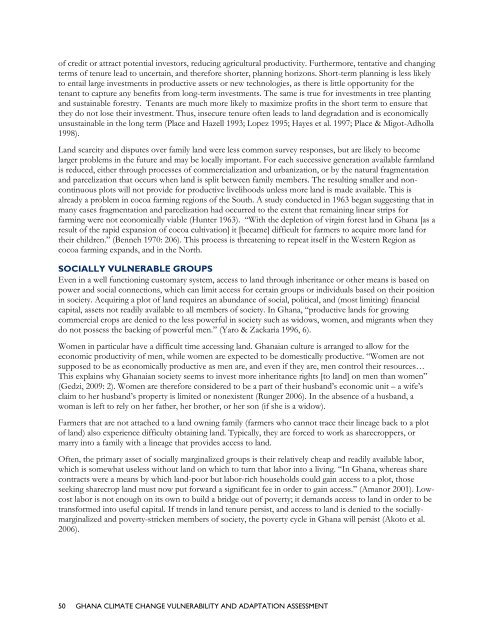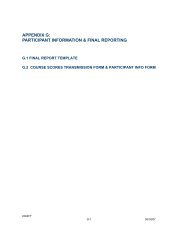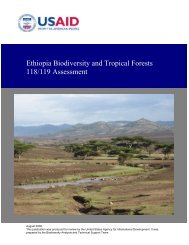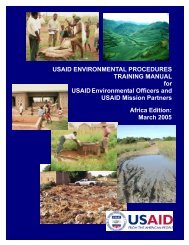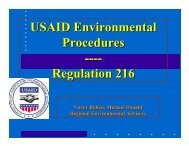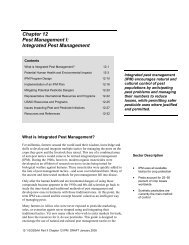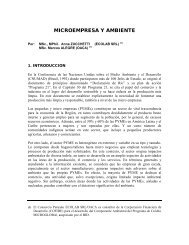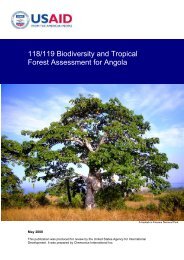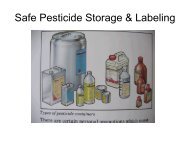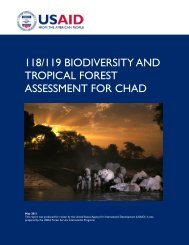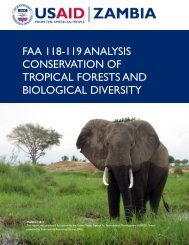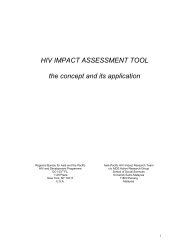ghana climate change vulnerability and adaptation assessment
ghana climate change vulnerability and adaptation assessment
ghana climate change vulnerability and adaptation assessment
- No tags were found...
You also want an ePaper? Increase the reach of your titles
YUMPU automatically turns print PDFs into web optimized ePapers that Google loves.
of credit or attract potential investors, reducing agricultural productivity. Furthermore, tentative <strong>and</strong> changingterms of tenure lead to uncertain, <strong>and</strong> therefore shorter, planning horizons. Short-term planning is less likelyto entail large investments in productive assets or new technologies, as there is little opportunity for thetenant to capture any benefits from long-term investments. The same is true for investments in tree planting<strong>and</strong> sustainable forestry. Tenants are much more likely to maximize profits in the short term to ensure thatthey do not lose their investment. Thus, insecure tenure often leads to l<strong>and</strong> degradation <strong>and</strong> is economicallyunsustainable in the long term (Place <strong>and</strong> Hazell 1993; Lopez 1995; Hayes et al. 1997; Place & Migot-Adholla1998).L<strong>and</strong> scarcity <strong>and</strong> disputes over family l<strong>and</strong> were less common survey responses, but are likely to becomelarger problems in the future <strong>and</strong> may be locally important. For each successive generation available farml<strong>and</strong>is reduced, either through processes of commercialization <strong>and</strong> urbanization, or by the natural fragmentation<strong>and</strong> parcelization that occurs when l<strong>and</strong> is split between family members. The resulting smaller <strong>and</strong> noncontinuousplots will not provide for productive livelihoods unless more l<strong>and</strong> is made available. This isalready a problem in cocoa farming regions of the South. A study conducted in 1963 began suggesting that inmany cases fragmentation <strong>and</strong> parcelization had occurred to the extent that remaining linear strips forfarming were not economically viable (Hunter 1963). “With the depletion of virgin forest l<strong>and</strong> in Ghana [as aresult of the rapid expansion of cocoa cultivation] it [became] difficult for farmers to acquire more l<strong>and</strong> fortheir children.” (Benneh 1970: 206). This process is threatening to repeat itself in the Western Region ascocoa farming exp<strong>and</strong>s, <strong>and</strong> in the North.SOCIALLY VULNERABLE GROUPSEven in a well functioning customary system, access to l<strong>and</strong> through inheritance or other means is based onpower <strong>and</strong> social connections, which can limit access for certain groups or individuals based on their positionin society. Acquiring a plot of l<strong>and</strong> requires an abundance of social, political, <strong>and</strong> (most limiting) financialcapital, assets not readily available to all members of society. In Ghana, “productive l<strong>and</strong>s for growingcommercial crops are denied to the less powerful in society such as widows, women, <strong>and</strong> migrants when theydo not possess the backing of powerful men.” (Yaro & Zackaria 1996, 6).Women in particular have a difficult time accessing l<strong>and</strong>. Ghanaian culture is arranged to allow for theeconomic productivity of men, while women are expected to be domestically productive. “Women are notsupposed to be as economically productive as men are, <strong>and</strong> even if they are, men control their resources…This explains why Ghanaian society seems to invest more inheritance rights [to l<strong>and</strong>] on men than women”(Gedzi, 2009: 2). Women are therefore considered to be a part of their husb<strong>and</strong>’s economic unit – a wife’sclaim to her husb<strong>and</strong>’s property is limited or nonexistent (Runger 2006). In the absence of a husb<strong>and</strong>, awoman is left to rely on her father, her brother, or her son (if she is a widow).Farmers that are not attached to a l<strong>and</strong> owning family (farmers who cannot trace their lineage back to a plotof l<strong>and</strong>) also experience difficulty obtaining l<strong>and</strong>. Typically, they are forced to work as sharecroppers, ormarry into a family with a lineage that provides access to l<strong>and</strong>.Often, the primary asset of socially marginalized groups is their relatively cheap <strong>and</strong> readily available labor,which is somewhat useless without l<strong>and</strong> on which to turn that labor into a living. “In Ghana, whereas sharecontracts were a means by which l<strong>and</strong>-poor but labor-rich households could gain access to a plot, thoseseeking sharecrop l<strong>and</strong> must now put forward a significant fee in order to gain access.” (Amanor 2001). Lowcostlabor is not enough on its own to build a bridge out of poverty; it dem<strong>and</strong>s access to l<strong>and</strong> in order to betransformed into useful capital. If trends in l<strong>and</strong> tenure persist, <strong>and</strong> access to l<strong>and</strong> is denied to the sociallymarginalized<strong>and</strong> poverty-stricken members of society, the poverty cycle in Ghana will persist (Akoto et al.2006).50 GHANA CLIMATE CHANGE VULNERABILITY AND ADAPTATION ASSESSMENT


